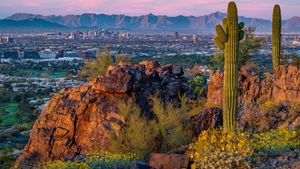Rodrigo Cuevas, the contemporary Asturian artist known for his unique blend of traditional music and modern influences, opened up about his childhood experiences during his recent interviews on the program 'Lo de Évole'. These heart-wrenching disclosures revealed his battles with bullying and the challenges of growing up gay in Oviedo, a city he described as conservative and unwelcoming.
After recounting his formative years, Cuevas stated emphatically, "Oviedo is a very conservative city where there is no space for anyone but a certain type of person. You always feel like you're on the margins." This setting, he explained, contributed significantly to enduring periods of bullying throughout his school years. Interestingly, he shared with Évole, "Do you know where I wasn't bullied? At the village. I never got called maricón (faggot) there; I had many friends, and none of them bullied me."
Visibly moved during the conversation, Cuevas candidly recalled memories of walking alone through the schoolyard, trying to hold back tears. "You had to keep your tears hidden; showing weakness was unacceptable,” he reflected, highlighting the emotional toll of his experiences. Despite the support he felt from friends and peers in his village, the artist felt compelled to hide his struggles from his family. “You felt it was weakness; it was shame,” he remarked, illustrating the complexity of his emotional turmoil.
He pointed out the lack of support from teachers, claiming, "I also recall how the teachers did nothing. They never spoke to you about it or provided psychological support." Cuevas described how he would often stay next to the teachers during recess to avoid taunts from classmates, saying, "I just wanted to be close so I wouldn’t be insulted."
After transferring to another school, Cuevas made drastic changes to fit what he thought was expected of him: "I decided I was going to be super macho to avoid insults. I stopped moving my hands, changed how I spoke, and tried to sound more masculine…just picture it—it was horrendous!" His determination to fit in led to significant changes to his persona, showing the lengths individuals may go to avoid bullying.
Earlier this year, during another interview on 'Lo de Évole', Cuevas invited the host, Jordi Évole, to his home village of Vegarrionda. There, he illuminated the reality of rural life, emphasizing the urgent challenges faced by such communities. "There are only three neighbors under 40 years old," he noted, expressing the demographic crisis affecting these areas. Cuevas lamented, "If we don’t organize ourselves, no one is going to come to save us. It’s impossible to hope for external solutions."
Cuevas also stood firm on socio-political issues during his discussion, especially concerning food practices, defending Minister Alberto Garzón’s controversial stance on meat consumption. "It would be wise to understand where our meat actually originates. Do we really believe the meat around us holds more value than factory-farmed alternatives? Yes, I do. Are people upset about suggestions to consume less factory-farmed meat? It seems to me they are being defended rather than attacked," he argued passionately.
These reflections bring light not only to Cuevas’s personal narrative but also to broader social issues, touching on empathy, support systems, and health consciousness within the community. His story resonates with many who share similar experiences, making his voice exceptionally valuable.
"It’s incredible how much we can overlook about each other’s struggles if we choose not to listen," said Cuevas. His insights serve as reminders of the enduring need for compassion and connection within communities, especially where traditional structures may fail to protect the vulnerable.
With the recent resurgence of these interviews on 'Lo de Évole', viewers are reminded of the powerful stories hidden behind artistic personas. Rodrigo Cuevas stands as not only an advocate for cultural heritage but as a beacon of hope and resilience for many facing adversity. His experiences illuminate the importance of community cohesion and the need for inclusive spaces where individuality is celebrated, not shamed.



